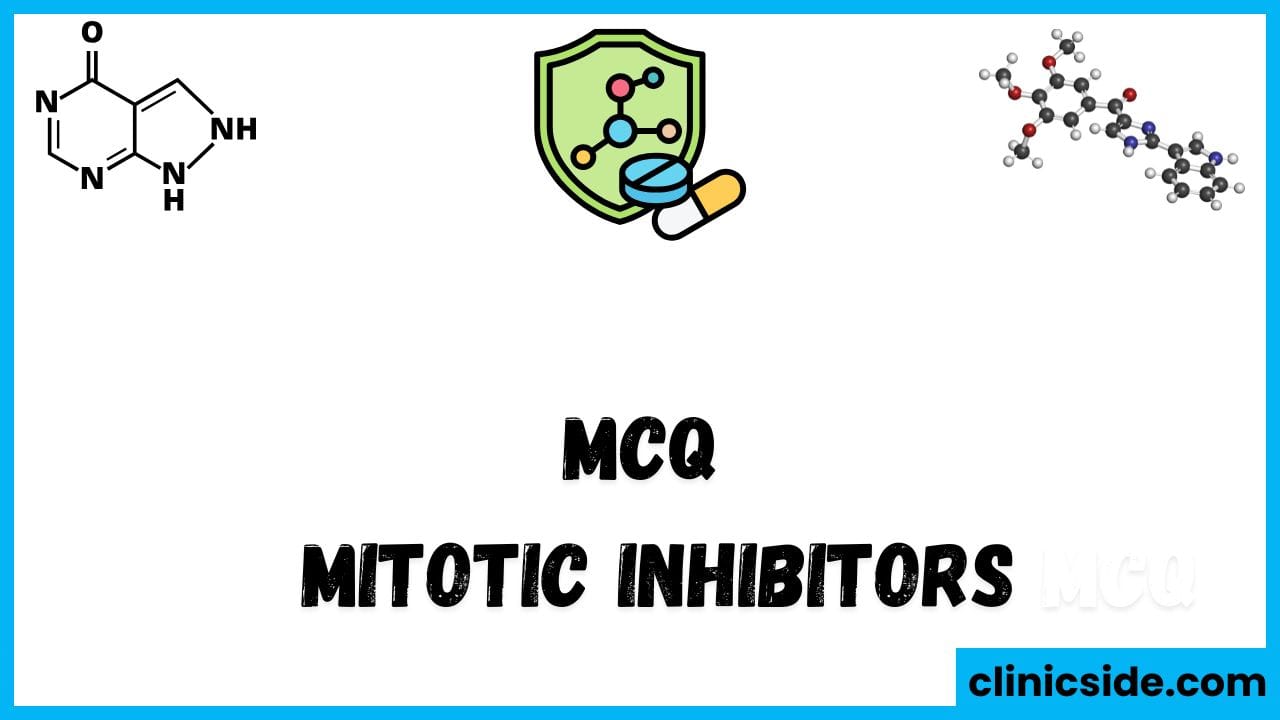Quiz
Available options: 1 to 20
Overview of Mitotic Inhibitors: Key Concepts
How Mitotic Inhibitors Work
Mitotic inhibitors like paclitaxel and vinca alkaloids are essential in combating cancer by interfering with cell division. Paclitaxel stabilizes microtubules, preventing their breakdown, while vinca alkaloids, such as vincristine and vinblastine, block microtubule formation. By halting the cell cycle, these agents effectively target cancer cells, offering an efficient way to manage cancer growth.
Comparing Taxanes and Vinca Alkaloids
Taxanes (paclitaxel and docetaxel) and vinca alkaloids (vincristine and vinblastine) are integral in cancer therapy but function differently. Taxanes stabilize microtubules, while vinca alkaloids prevent their assembly. These drugs treat cancers such as breast, ovarian, and testicular types. For instance, vincristine is often used for neuroblastoma, whereas vinblastine is employed in Hodgkin’s lymphoma, showcasing their specific roles.
Tailored Uses of Mitotic Inhibitors
Each mitotic inhibitor has a targeted application. Paclitaxel is widely utilized for breast and ovarian cancer and is effective against Kaposi’s sarcoma, often in combination with cisplatin. Docetaxel is particularly beneficial in metastatic prostate cancer. Vinblastine treats Hodgkin’s lymphoma and testicular cancer, while vincristine is preferred for certain pediatric cancers, such as neuroblastoma.
Understanding Side Effects
The side effects of mitotic inhibitors vary by drug. Vincristine often causes peripheral neuropathy, while vinblastine’s primary limitation is myelosuppression. Paclitaxel can lead to hypersensitivity, alopecia, and nerve toxicity, whereas docetaxel may cause fluid retention and bone marrow suppression. Identifying these effects helps optimize patient care during treatment.
Combination Treatments
Combining mitotic inhibitors with other drugs boosts their effectiveness. For example, paclitaxel is paired with cisplatin to treat ovarian cancer, and corticosteroids are often used to prevent allergic reactions. Similarly, docetaxel is frequently combined with agents to enhance its therapeutic role in breast and prostate cancers. These strategies maximize efficacy while reducing side effects.
Unique Features of Taxanes
Taxanes, including paclitaxel and docetaxel, are derived from the yew tree and disrupt cancer cell division by stabilizing microtubules. Paclitaxel is essential for breast and ovarian cancer, while docetaxel is a preferred agent for prostate cancer. These drugs’ origins and mechanisms highlight their critical role in oncology.
Managing Hypersensitivity
Paclitaxel is associated with significant hypersensitivity reactions. Preventive measures, such as using corticosteroids and antihistamines before administration, help mitigate these effects. This approach ensures that patients can continue treatment safely, enhancing the overall success of therapy.
Target-Specific Cancer Treatments
Taxanes and vinca alkaloids precisely target tubulin, affecting microtubules to halt cancer cell division. Taxanes stabilize tubulin, whereas vinca alkaloids block its assembly. This precision reduces collateral damage to healthy cells, making these drugs effective. Advances in targeted therapies continue to improve outcomes.
Specialized Drug Applications
Certain mitotic inhibitors have distinct applications. For instance, vinblastine is used in Kaposi’s sarcoma and Hodgkin’s lymphoma, while docetaxel is effective against metastatic prostate cancer. Vincristine’s role in treating neuroblastoma and specific leukemias emphasizes the need for tailored therapies based on cancer type.
Advancements in Therapy
Ongoing research is expanding the applications of mitotic inhibitors. New formulations of taxanes aim to reduce allergic reactions, while novel vinca alkaloids are being developed for enhanced efficacy. Personalized medicine approaches, incorporating genetic profiling, are improving outcomes and reducing side effects, marking a significant evolution in cancer treatment.
Conclusion
Mitotic inhibitors, including taxanes and vinca alkaloids, play a pivotal role in modern cancer therapy. Their precise mechanisms of action, targeted applications, and manageable side effects underscore their importance in oncology. Advances in research, combination regimens, and personalized approaches are further enhancing their effectiveness. This comprehensive understanding positions these drugs as cornerstone agents in the fight against cancer.





